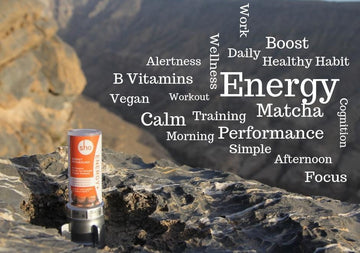sho Nutrition welcomes guest contributor Josh Wardini of 16best.net for a closer look at the value of B Vitamins.
Keeping up to date with all the things that your body needs to stay healthy can be quite confusing. You need to ensure that you are getting enough sleep, exercising enough, and cooking with healthy ingredients so you can get necessary vitamins and minerals in your diet. With B vitamins alone, there are 8 different types to keep track of, each of which has its own purpose and plays its own part in the body.
B vitamins as a group are water soluble. They are carried around in the body’s tissues, but are not stored in the body like some other vitamins.
All B vitamins are vitally important for the correct functioning of the body, such as metabolism, the normal functioning of the central nervous system, and the formation of red blood cells, to name just a few.
Essentially, we need them for everyday energy and to keep the body going. B vitamins collectively are a powerhouse of essential nutrients.
All of the B vitamins that we need can be ideally obtained through diet, yet many people have dietary nutritional gaps, which is when supplements may be useful.
Getting Sufficient Vitamin B
In order to stay healthy, it is important to maintain a healthy and balanced diet that contains foods such as meats, fruits, grains, and vegetables. 
Although it is possible to get enough of all types of B vitamin through a proper diet, the truth is, for some people it can be very difficult to do so. Many people have low levels of at least a few of the varieties of this vitamin, and although they are abundant in various foods, they are also very delicate and can easily be destroyed.
Because they are water soluble, when we are cooking foods it is likely that many of the vitamins will be cooked out, or just get lost in the water. Or, if you are eating lots of processed food, many of the B vitamins are destroyed through the process of manufacturing.
The biggest problem lies in the fact that other than B-12, the vitamins are not stored in the body for very long, therefore we need to make sure we are getting a constant supply to replenish those that are lost, and this really needs to be done on a daily basis.
Vitamin B Deficiency
The symptoms of a vitamin deficiency depend very much on the type of vitamin B that you are lacking. However, usually normal symptoms range from fatigue and confusion to anemia, and can even compromise the immune system. In some cases, skin rashes have been known to occur. Deficiency in just one of the B vitamins can lead to some serious health consequences.
It is especially important for pregnant women to get enough of vitamin B every day, as lack of vitamin B-12, for example, could contribute to birth defect or put the baby at risk of possible neurological problems.
Pregnant women should also make sure they get enough Folic acid, or vitamin B-9, as this can reduce the risk of central nervous system defects in unborn babies.
 The most common vitamins to be deficient in are Thiamine, Niacin, and Pyridoxine. Being deficient in Thiamine and Niacin is often attributed to an excess in alcohol consumption. This can adversely affect coordination, muscle function, and even memory.
The most common vitamins to be deficient in are Thiamine, Niacin, and Pyridoxine. Being deficient in Thiamine and Niacin is often attributed to an excess in alcohol consumption. This can adversely affect coordination, muscle function, and even memory.
Being deficient in Pyridoxine can also be because of excessive alcohol consumption, but is also more common in women who are on the contraceptive pills, those with Thyroid disease, and sometimes in the elderly. Symptoms here could include depression and insomnia, irritability, and muscle twitching.
Why Are They So Important?
B vitamins are all grouped together because of the fact that they all have very similar characteristics. Additionally, many of them work together to ensure the proper functioning of the body, collaborating on some of the roles that are needed in order to maintain a healthy body.
Collectively, they are responsible for both energy and hormone production, red blood cell synthesis, nerve function, and metabolism. Plus, they can also aid overall brain health, prevent anxiety and depression, and help with mental alertness. Taking away just one of these B vitamins can cause big problems for the body, and may even cause it to stop functioning as it should.
 Vitamin B-1 (Thiamine)
Vitamin B-1 (Thiamine)
This type of B vitamin is used to help convert carbohydrates into energy, along with aiding nerve and muscle functioning which is achieved by regulating the flow of electrolytes that go in and out of the muscles.
Ideally, a female should be getting 0.8mg of Thiamine every day, which can be achieved by eating foods such as trout, soybeans, and sunflower seeds, among others.
It is not very common to be deficient in vitamin B1, usually it is combined with another disease or problems such as in alcoholics, or those with Crohn’s disease. Symptoms can include difficulty with coordination, fatigue, having a low mood, and abdominal discomfort.
Vitamin B-2 (Riboflavin)
This type of vitamin is not stored in the body, which means you need to consume certain type of foods every day to make sure your body has enough of it. Vitamin B-2’s role in the body is to break down essential nutrients from carbohydrates, proteins, and fats, maintaining energy supply to the muscles. It is also important for red blood cells production.
You should be able to get enough Riboflavin in your diet as it occurs naturally in many foods such as eggs and salmon. It is also possible to make Riboflavin synthetically, and it is added into sugary sweets to give them that glowing, almost neon color.
Women should be in taking around 1.1mg a day, an amount that is not difficult to get. You may know if you are deficient in B-2 if you have dry or cracked lips, a sore throat, and sensitivity to light.
Vitamin B-3 (Niacin)
Niacin is used in the body to help metabolize fat, alcohol, and glucose. It can also help reduce the amount of bad cholesterol in the blood stream and promote good levels of it. Usually, 13mg of daily intake should be enough for women, and you will be able to get it by eating tuna, peanuts, mushrooms, and green peas.
Although you are not likely to consume too much Niacin naturally, it may be possible to take too many supplements, and symptoms here may include headaches, diarrhea, and nausea.
Vitamin B-5 (Pantothenic Acid)
The main role of Vitamin B-5 is to help the energy get released from the food that we consume. As well as helping to form red blood cells and oxidize fatty acids and carbohydrates, it has also been known to reduce stress in individuals by ensuring the correct functioning of the adrenal glands.
As a water-soluble vitamin, it is not possible for it to be stored in the body, therefore it is important to consume it through diet. Women should be able to get 13mg through foods such as eggs, mushrooms, and avocado.
Vitamin B-6 (Pyridoxine)
This one has a combination of important functions for the body - it helps with red blood cell production, liver detoxification, the development and proper function of the brain and nervous system, as well as playing a role in about 100 metabolic enzyme reactions.
A range of different foods have this vitamin in them, therefore the recommended 1.2mg for women everyday can be consumed quite easily. Some foods where vitamin B-6 can be found naturally include sunflower seeds, bananas, dried prunes, and many others.
Additionally, some cereals and various other products are fortified with the vitamin, which can make it even easier to get enough in your diet.
Vitamin B-7 (Biotin)
Vitamin B-7 can help to contribute to healthy skin and hair, plus it also plays a mart in the metabolism of lipids, proteins, and carbohydrates.
If you make sure that you are eating a healthy and balanced diet every day, it shouldn’t be difficult to get enough of it into your body. Dieticians do not really recommend a set amount of this vitamin, but it is good to know that It can be found in foods such as eggs, salmon, strawberries, sweet potato, and broccoli.
Vitamin B-9 (Folic Acid)
Vitamin B-9 is often just simply referred to as Folic acid. Its main role is helping in the formation of red blood cells, as well as reducing the risk of defects in the central nervous system of unborn babies. That’s why it is particularly important for pregnant woman to make sure they have enough Folic acid in their diet.
Like most B vitamins, it can’t be stored in our bodies for a long period of time, therefore we need to make sure we have a constant supply of it. Adults need to make sure they are getting 0.2mg every day, and this should easily be obtained through diets. These include foods such as spinach, lentils, lettuce, and asparagus.
You should also make sure you are not taking too much Folic acid, as it could result in stomach and skin problems, as well as sleep disturbances. It could also potentially mask the deficiency of other essential vitamins.
Vitamin B-12 (Cobalamin)
Cobalamin is one of the most important vitamins when it comes to the metabolism of carbohydrates, proteins, and lipids. It also helps in the production of red blood cells in conjunction with other B vitamins, as well as aiding in the absorption of iron.
Because this is the most active of all B vitamins, it is the one that we need the least of. For adults, the recommended dose is somewhere in between 1.5 and 2.4 mg. It is usually very easy to get enough cobalamin naturally, as it can be found in a variety of different foods, most of which are animal based. Some examples include clams, mackerel, trout, and eggs, or if you are a vegetarian, you are also able to get the vitamins from silken tofu.
The Value of Supplements
 If possible, we should all be trying to get enough vitamins and minerals through diet. Sometimes, however, this is not possible, therefore we have to get them through other means, such as supplements.
If possible, we should all be trying to get enough vitamins and minerals through diet. Sometimes, however, this is not possible, therefore we have to get them through other means, such as supplements.
(Editor's note: notice the difference between standard supplement sizes, left, and sho Nutrition's Spheri-Gels, right).
Nutritional supplements are a big seller in the drug industry, and sometimes it can be difficult to know which are the best companies to go with. Consumers should look for companies with researched-backed, quality ingredient products.
As long as vitamin B supplements are taken in the correct dosage, they are pretty much safe to take. Of course, like with all drugs, it is possible to encounter some side effects if your body doesn’t agree with them or if they are taken in excess (yet again, since B vitamins are water-soluble and not stored in the body, they are considered a safe supplement as what is not needed by the body will be flushed - a detoxing which, in and of itself, can be beneficial).
For vegans and vegetarians, the biggest problem is likely to be the struggle to get enough vitamin B-12, as really these are only found in animal based food. That’s why many vegans are likely to supplement this vitamin in some way.
While many of these vitamins work in tandem with each other, each has its own specific benefits, so you should be doing all you can to ensure that you are getting the right amount of each every day. The easiest way this can be achieved is to simply try and get a balanced diet, eating a good amount of each of the main food groups, with lots of health fruits and vegetables. However, since B vitamins deficiencies are common, many people can benefit from supplements of this nutrient.






![B Vitamins 101: What You Need to Know for Better Health [Infographic]-sho Nutrition LLC](http://www.shonutrition.com/cdn/shop/articles/a6b54228eaae9977106676b1cd48a1a4.png?v=1552771121&width=360)


